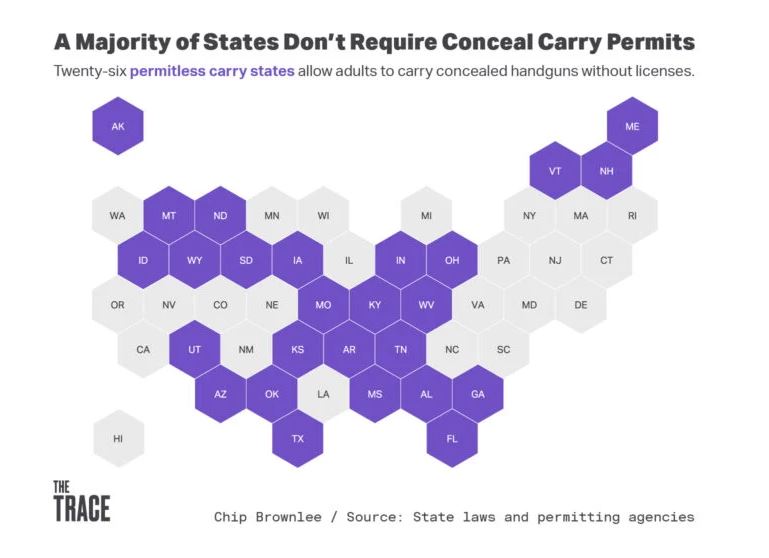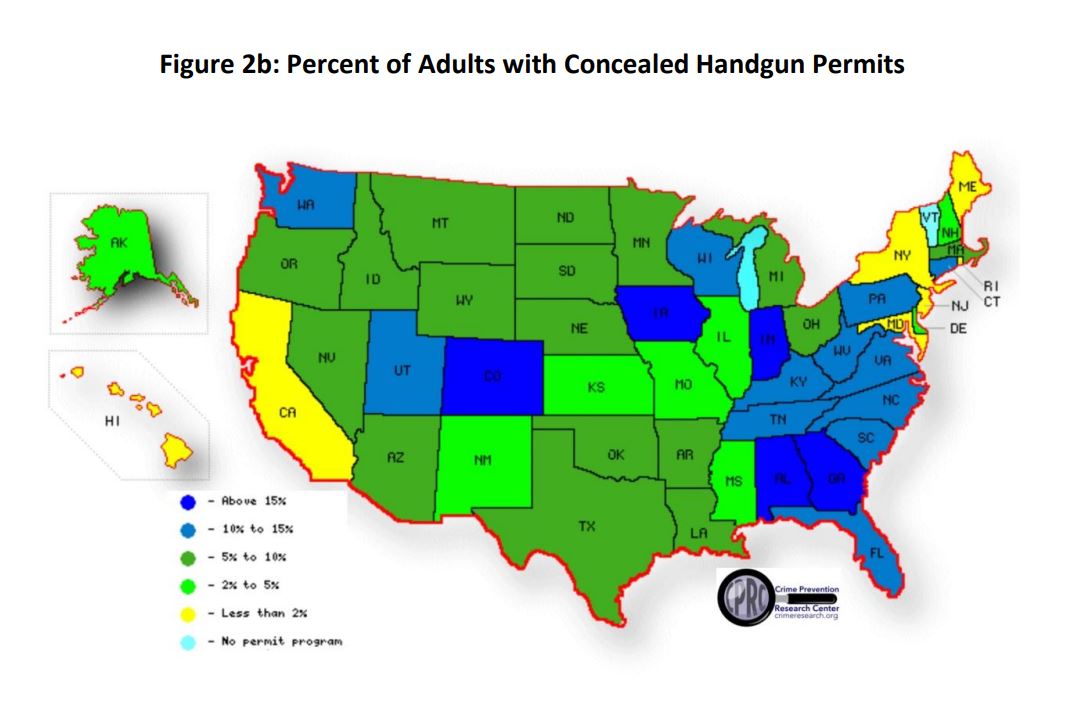This article, originally published on June 23, 2019, has been updated to reflect current statistics. Please note some concealed carry laws are currently under review. ALWAYS check with your state legislature for the most up-to-date laws and policies.
Gun laws have long been a hot-button topic, but as more campuses are choosing to or are being forced to create concealed carry policies, it is also becoming a popular discussion among campus safety officials. Here is an updated list of states that allow concealed carry on college campuses.
Whether you agree with campus concealed carry or not, there seems to be an abundance of terms circulating regarding concealed carry — many of which mean the exact same thing. Because of this, we wanted to provide a breakdown of the terms you may see when doing research on the topic. (It should be noted that Campus Safety opposes arming teachers or allowing others with gun permits who aren’t law enforcement on campus. To read the reasons why CS is opposed to campus carry, read Should We Allow CCP Holders to Carry Guns on Campus? 11 Reservations of a ‘Gun Guy’ and Negligent Discharges: A Real Risk If We Allow Guns on Campus.)
According to The Educational Fund to Stop Gun Violence, nearly 500 people die each year from unintentional firearm injuries. Unintentional firearm injuries account for 37% of nonfatal firearm injuries, and there are about 535 accidental gun deaths each year. Americans are also four times more likely to die from an unintentional gun injury than people living in other high-income countries. A 2016 study by the Johns Hopkins Bloomberg School of Public Health found West Virginia, Kentucky, South Carolina, Louisiana, Arkansas, Alabama, and Tennessee suffer from disproportionately high rates of unintentional firearm deaths. At the time, researchers noted none of the states had laws requiring the safe storage of guns.
The Trace also reports that the majority of states allow adults to carry concealed handguns without a permit or license. Since 2021 alone, eleven states have passed permitless carry, including Alabama, Arkansas, Georgia, Indiana, Iowa, Montana, Ohio, Tennessee, Texas, and Utah. Most recently, on April 3, 2023, Florida became the 26th state to have permitless carry after Governor Ron DeSantis signed a bill into law.

The Trace further reports that since most states no longer require permits at all, a majority of states no longer require live-fire training to carry a concealed gun. The 17 states that require training include California, Connecticut, Delaware, Hawaii, Illinois, Louisiana, Maryland, Michigan, Minnesota, Nebraska, Nevada, New Jersey, New Mexico, New York, North Carolina, Rhode Island, and South Carolina.
In Florida, incidents of negligent discharge increased by 82% from 2007 to 2017, while the rest of the country remained relatively stagnant during that time period. Interestingly, according to SSRN, Florida currently has the highest number of concealed carry permits with around 2.57 million. The second highest is Texas with about 1.68 million. Because of this, we also want to provide a breakdown of concealed carry permits by state and laws and requirements by state.
Concealed Carry Terminology and Carry Laws by State
Let’s look at the common acronyms used when talking about concealed carry:
- CCW – Concealed Carry Weapon
- CCP – Concealed Carry Pistol
- CCP – Concealed Carry Permit
- CCL – Concealed Carry License
- CPL – Concealed Pistol License
- CHP – Concealed Handgun Permit
- CHL – Concealed Handgun License
- CWP – Concealed Weapons Permit
- LTC – License To Carry
- LTCF – License to Carry Firearm
Each state has its own concealed carry laws and requirements. According to USA Carry, there are four categories each state/territory can fall under: Shall Issue, May Issue, Constitutional Carry, and Right Denied.
Below are USA Carry’s more specified definitions and a list of the states/territories that fall under each category. We have also linked each state to its specific laws and requirements. Please note the pages we have linked to are maintained by the National Rifle Association (NRA). Each state’s landing page is dated, which we presume means that was the last date that specific page was updated. Be sure to check with your state legislature for completely up-to-date laws and requirements.
Shall Issue to Resident Only
States that are Shall Issue to Resident Only will issue any resident of that state a concealed carry permit as long as they meet all requirements.
States/territories that fall under this category are:
Shall Issue to Residents and Non-Residents
States that are Shall Issue to Residents and Non-Residents will issue any resident of that state or a non-resident a concealed carry permit as long as they meet all requirements.
States/territories that fall under this category are:
- District of Columbia
- Illinois
- Maryland
- Massachusetts
- Minnesota
- Nevada
- New Jersey
- North Carolina
- Oregon
- Pennsylvania
- Puerto Rico
- Rhode Island
- South Carolina
- Virginia
- Washington
- Wisconsin
May Issue to Residents Only
States that are May Issue to Residents Only have the authority to make a judgment on whether or not they want to issue a concealed carry permit to a resident of that state even after they have met all requirements. They will not issue to non-residents of that state.
States/territories that fall under this category are:
- Delaware
- Virgin Islands
May Issue to Residents and Non-Residents
States that are May Issue to Residents Only have the authority to make a judgment on whether or not they want to issue a concealed carry permit to a resident of that state or non-resident even after they have met all requirements.
States that fall under this category are:
Constitutional Carry and Permits for Residents Only
States that are Constitutional Carry and Shall Issue to Residents Only have some form of Constitutional Carry law that allows residents (and in some cases non-residents) to carry a concealed weapon without having a permit. But they will still issue any resident of that state a concealed carry permit as long as they meet all requirements.
States that fall under this category are:
Constitutional Carry and Permits for Residents and Non-Residents
States that are Constitutional Carry and Shall Issue to Residents and Non-Residents have some form of Constitutional Carry law that allows residents (and in some cases non-residents) to carry a concealed weapon without having a permit. But they will still issue any resident of that state and non-residents a concealed carry permit as long as they meet all requirements.
States that fall under this category are:
- Arizona
- Arkansas
- Idaho
- Indiana
- Iowa
- Kansas
- Kentucky
- Maine
- Mississippi
- Missouri
- New Hampshire
- North Dakota
- Ohio
- Oklahoma
- South Dakota
- Tennessee
- Texas
- Utah
- West Virginia
Constitutional Carry and No Permits Issued
States that are Constitutional Carry and Do Not Issue Permits have some form of Constitutional Carry law that allows residents (and in some cases non-residents) to carry a concealed weapon without having a permit. They also do not issue any form of concealed carry permit.
States that fall under this category are:
Right Denied
States that are Right Denied DO NOT allow private citizens to carry handguns and do not issue concealed carry permits. This only applies to American Samoa and the North Mariana Islands.
Gun Permits Issued by State
In 2022, an estimated 22.01 million American adults had concealed carry permits, making up approximately 8.5% of the U.S. adult population, according to SSRN. To compare, in 2017, the Crime Prevention Research Center found there were 16.3 million permits (6.6% of the adult population).
Additionally, as of June 30, 2022, Alabama has the highest population of permit holders with 1,273,671 active permits — making up 32.5% of the adult population. The second highest is Indiana at 1,221,850, making up 23.4% of the adult population. The chart below, provided by SSRN, shows where each state falls regarding the percentage of adults with concealed handgun permits:

We hope these lists and data sets are helpful, and we encourage our readers to let us know if any of these lists need to be amended. We feel strongly that information on individual states’ concealed carry policies should be easily available to the public so people can stay informed.
Again, always check with your state legislature for the most up-to-date campus concealed carry policies.







